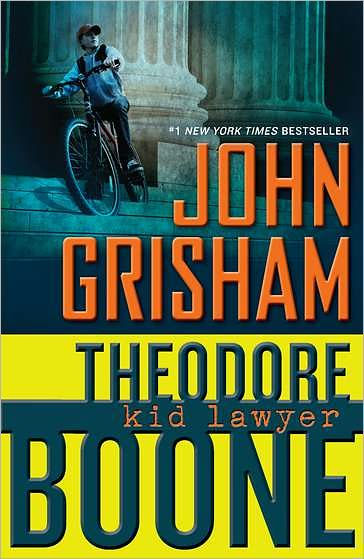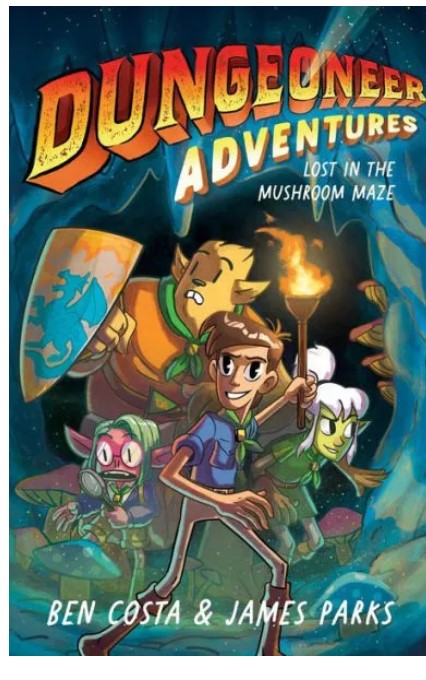Theodore Boone is the son of two well-respected lawyers in the town of Strattenburg. He aspires to be a lawyer himself. In fact, he prides himself on providing legal advice to classmates, and even some adults. But when a murder is committed and the trial commences in the otherwise peaceful town, Theo discovers that there is a witness to the crime that no one knows about. But the witness, an illegal immigrant, is hesitant to come forward. Theo must decide how to carefully work around the delicate issue that could result in someone getting away with murder.
This pre-teen novel has a well-developed and interesting plot. While there is mention of a murder, there are few gory details, making it pre-teen friendly. There are many positive role models in the book, including lawyers, judges, policemen, and teachers. Theodore explains the basics of the judicial system in a way that young readers can easily understand. Although an illegal immigrant is one of the main characters in the book, there are very few political influences that affect his treatment. There are several references to drugs and alcohol, but in no instances are they glorified. Overall, this book is educational, exciting, and well-suited for pre-teens.
Sexual Content
- Theodore lacks any romantic interest for his friend, April. “It wasn’t a romance; they were too young for that. Theo did not know of a single thirteen-year-old boy in his class who admitted to having a girlfriend. Just the opposite. They wanted nothing to do with them. And the girls felt the same way. Theo had been warned that things would change, and dramatically, but that seemed unlikely.”
- Because girls and boys were split into different classes, there was flirting in the hallways. “There was some awkward flirting between the rooms as the boys mixed with the girls. During classes, they were ‘gender separated,’ according to a new policy adopted by the smart people in charge of educating all the children in town. The genders were free to mingle at all other times.”
- Theo has a romantic interest in a woman who works as a court clerk. “Jenny, the beautiful, was waiting. ‘Well, hello, Theo,’ she said with a big smile as she looked up from her computer at the long counter. ‘Hello, Jenny,’ he said. She was very pretty and young and Theo was in love. He would marry Jenny tomorrow if he could, but his age and her husband complicated things. Plus, she was pregnant, and this bothered Theo, though he mentioned it to no one.”
- The narrator mentions the prettiest, most popular girl in Theo’s class; “The most popular girl in the eighth grade was a curly-haired brunette named Hallie. She was very cute and outgoing and loved to flirt.”
- When Hallie tells Theo to call her, Theo gives an excuse related to her flirtatiousness; ‘“Why don’t you call me sometime?’ she asked. Why? Now that was a good question. Probably because he assumed she was too busy talking to all the other boys. She changed boyfriends every month. He’d never even thought of calling her. ‘I’ll do that,’ he said. But he knew he wouldn’t. He wasn’t exactly looking for a girlfriend, and besides, April would be devastated if he began chasing a flirt like Hallie.”
Violence
- Theo has a hatred for April’s parents because they treat April poorly. “He despised her parents for the way they treated her. He despised them for the chaos of their lives, for their neglect of April, for their cruelty to her.”
- Murder is mentioned frequently throughout the book. ‘“About eighty percent of those indicted for murder eventually plead guilty, because they are in fact guilty. The other twenty percent go to trial, and ninety percent of those are found guilty. So, it’s rare for a murder defendant to be found not guilty.”’
- Theo considers the likelihood that Mr. Duffy will commit another murder. “Why would the real killer be a security risk if he showed up to watch the trial? What’s he gonna do? Kill somebody else? In open court? In front of dozens of witnesses?”
- Ike, Theo’s uncle, gives him details on how the murder was committed. “’He choked her?’ Theo had read every newspaper story about the murder and knew the cause of death. ‘That’s the theory. She died of strangulation. The prosecutor will claim that Mr. Duffy choked her, then ransacked the house, took her jewelry, tried to make it look as if she had walked in on a burglar.’”
- In the prosecutor’s opening statement, he says how the body was found. “When the body was found, the front door of their home was unlocked and slightly open.”
- In the prosecutor’s opening statement, he mentions what Mrs. Duffy’s dead body looked like. “The cause of death was strangulation. With the approval of Judge Gantry, Mr. Hogan stepped to a projector, hit a button, and a large color photo appeared on the screen opposite the jury. It showed Mrs. Duffy lying on the carpeted floor, well-dressed, seemingly untouched, her high-heeled shoes still on her feet… Apparently she was ready to leave the house when she was attacked and killed.”
- The prosecutor gives further, more detailed information as to how Mrs. Duffy was killed. “An autopsy revealed the true cause of death. The person who killed Mrs. Duffy grabbed her from behind and pressed firmly on her carotid artery. Mr. Hogan placed his fingers on his own carotid artery, on the right side of his neck. ‘Ten seconds of firm pressure in just the right place and you lose consciousness,’ he said, then waited while everyone else waited to see if he might just collapse himself right there in open court. He did not. He continued, ‘Once Mrs. Duffy passed out, her killer kept pressing, firmer and firmer, and sixty seconds later she was dead. There are no signs of a struggle—no broken fingernails, no scratches, nothing. Why? Because Mrs. Duffy knew the man who killed her.”’
- The narrator mentions Mrs. Duffy’s time of death. “The autopsy placed her time of death around eleven forty-five.”
- The prosecutor reiterates that Mr. Duffy did in fact kill his wife. “The mere fact that a good lawyer kept saying that Mr. Duffy killed his wife made his theory sound believable.”
- The prosecutor mentions Mrs. Duffy’s death once more at the end of his opening statement. ‘“This was a cold-blooded murder, ladies and gentlemen. Perfectly planned and carefully executed. Not a hitch. No witnesses, no evidence left behind. Nothing but a lovely young woman brutally chocked to death.’”
- In pet court, someone demands to have a snake destroyed. ‘“Can’t you order it destroyed?’ ‘You want the death penalty for Herman?’ ‘Why not? There are children in our building.’ ‘Seems kind of harsh,’ Judge Yeck said. It was obvious he was not going to order the death of Herman.”
- In pet court, Judge Yeck threatens to destroy all of the defendant’s pet snakes if they escape again. ‘“If Herman escapes again, or if your snakes are caught outside of your apartment, then I have no choice but to order them destroyed. All of them. Clear enough?'”
- In pet court, tempers fly and a pet snake is threatened. “‘I swear I’ll kill him. Should’ve killed him this time, but I wasn’t thinking. And, I didn’t have an ax.'”
- Theo thinks about the blood, or lack thereof, at the murder scene. “There was no blood at the scene, right? So there would be no traces of blood on the gloves.”
- Theo thinks about hair possibly being the proof that he needs to prove Mr. Duffy’s guilt. “A strand of hair would be even more proof that her husband killed her.”
Drugs and Alcohol
- Mr. Boone smokes. “Mr. Boone smoked a pipe, and preferred to do so with the windows closed and the ceiling fan off so that their air was thick with the rich aroma of whatever flavored tobacco he happened to favor that day. The smoke didn’t bother Theo either, though he did worry about his father’s health.”
- April’s parents were arrested on drug charges. “Both her parents had been arrested on drug charges, though neither had served time.”
- Theo’s father mentions the consequences that would result from him missing school to watch the trial and makes a reference to alcohol. ‘“I will not bail you out of jail. You’ll sit there for days with common drunks and gang members.”’
- Theo mentions how dangerous the neighborhood is where his friend’s brother lives. “The Quarry was a rough part of town where the lower income people lived. Strattenburg was a safe city, but there was an occasional shooting or a drug bust, and these always seemed to happen around The Quarry.”
- Theo’s uncle has a drinking problem. “Ike drank too much, and this unfortunate habit made for slow mornings. Over the years, Theo had heard adults whispering about Ike’s drinking. Elsa had once asked Vince a question dealing with Ike, and Vince replied with a curt, ‘maybe if he’s sober.’”
- Theo jokingly asks his uncle for a beer; “Ike opened a small refrigerator on the floor behind his desk. ‘I have Budweiser and Sprite.’ ‘Budweiser,’ Theo said. Ike gave him a Sprite and popped the top of a can of Bud for himself.”
- Theo’s classmate, Woody, has a brother who was arrested for drug possession and distribution. “‘What’s the charge?’ ‘Drugs. Possession of pot, maybe distribution.’ ‘There’s a big difference between possession and distribution.’ ‘Can you help us?’ ‘I doubt it. How old is he?’ ‘Seventeen.’ Theo knew the brother by reputation, and it was not a good one. ‘First offense?’ Theo asked, though he suspected the answer was no. ‘He got busted for possession last year, his first. Slap on the wrist.’ ‘Your parents need to hire a lawyer, Woody. It’s that simple.’ ‘Nothing’s simple. My parents don’t have the money, and if they did they wouldn’t spend it on a lawyer. There’s a war in my house, Theo. Kids against parents, and nobody’s taking prisoners. My stepfather has been fighting with my brother over the drug thing, and he’s promised a thousand times he will not get involved when the cops bust him.’”
- Theo is watching the trial from a secret spot when he sees someone smoking. “Theo froze and got a whiff of something burning. The man was smoking a cigarette, which was against the rules because they were still inside the building. He blew a huge cloud, then stepped onto the landing. It was Omar Cheepe, visible now with his massive slick head and black eyes. He looked up at Theo, said nothing, then turned and walked away. Theo did not know if he had been followed, or if the stairwell was one of Omar’s smoking places. There were cigarettes everywhere. Maybe others sneaked down there for a smoke.”
- A group of teenagers is seen smoking. “A gang of young teenagers loitered about, all smoking and trying to look tough.”
Language
- None
Supernatural
- None
Spiritual Content
- God is mentioned at the beginning of the trial. ‘“Let all who have matters come forth. May God bless this court.”’
- Theo’s friend, Julio, tells Theo how his cousin prays for his family; ‘“He finished his lunch and was saying his prayers for his family when the man came out of the same door.”’
- Once again, Julio’s cousin is said to pray for his family. ‘“Our man liked to sneak away from the others, eat by himself, say his prayers, and look at a photo of his family back home.”’










